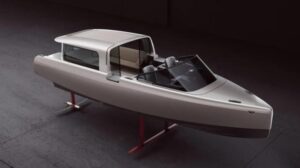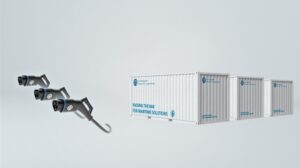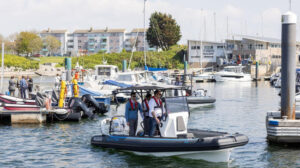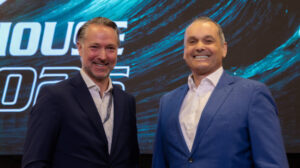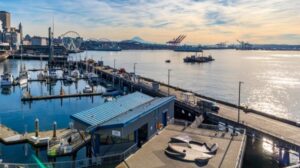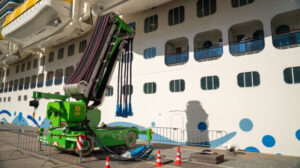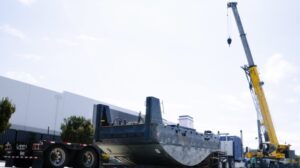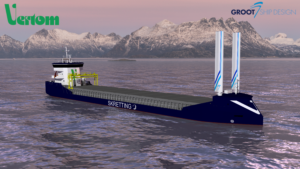Industry news
Global electric boat market predicted to reach US$16.7bn by 2032
MarketDigits has released the Global Electric-Boat Market Size, Status, and forecast for 2025-2032 report which predicts that the global electric boat market size is projected to reach US$16.7bn by 2032, growing at a CAGR of 12.10% from 2024 to 2032. It also states that the global electric boat market size was valued at US$5.1bn in 2024.
Growing tourism sector
According to the report, the surge in demand for recreational boating is one of the main drivers for the growth of the electric ship market. Recreational boating offers a high level of customization and personalization, as tourists can choose the type of boat, duration and activities and tailor their experience, and boat-sharing platforms, organized tours and rental services make it easier for individuals to experience boating without owning a boat.
NES to supply three onshore charging stations to Norled
Norwegian ferry operator Norled has contracted Norwegian Electric Systems (NES) to deliver three onshore charging stations that will be used at three ports in northern Norway.
Onshore charging stations
The charging stations will be installed at the ports of Stokkvågen, Lovund and Træna. Under the contract, NES will supply three complete containerized onshore charging stations, including transformers, switchboards, control system and data collection system. Alongside this, the company will deliver an e-house with a connection to the onshore power grid.
NES will also provide the charging plug that connects the charging stations to the three new-build battery-hybrid ferries.
University of Plymouth adds electric boat to education and research fleet
The University of Plymouth in the UK has become the first UK university to add a boat powered by electricity to its fleet of education and research vessels. The new ZENOW RS Pulse is part of the ZENOW project (Zero Emission Network of Workboats), which will see a further 14 similar vessels launched across the country.
Progressing university research
The £115,000 (US$153,000) boat is on loan to the university for three years. The University of Plymouth will analyze data relating to how the research vessels are used during this period.
Executive dean Professor Christopher Fogwill, said, “Plymouth has the largest fleet of boats of any British higher education institution, and we’re proud to be the only university in the UK recognized as carbon neutral, having retained our PAS 2060 verification last year.
Wärtsilä and Höegh Evi develop world’s first floating ammonia-to-hydrogen cracker
Wärtsilä Gas Solutions and marine energy infrastructure company Höegh Evi have completed development of what they state is the world’s first floating ammonia-to-hydrogen cracker. This project enables floating import terminals to produce hydrogen at industrial-scale volumes from transported ammonia.
Ammonia cracker technology
The industrial-scale ammonia cracker has a modular design that enables integration into both hybrid floating storage and regasification units (FSRUs) and dedicated floating hydrogen terminals. According to the partners, the technology is highly scalable with a send-out capacity of up to 210,000 metric tons of hydrogen annually.
Erik Nyheim, CEO of Höegh Evi, said, “The floating ammonia-to-hydrogen cracker developed by Höegh Evi, Wärtsilä Gas Solutions and partners is a game-changer for the hydrogen economy and the energy transition in Europe.
Port of Seattle releases 2050 electrification strategy
The Port of Seattle has released its Seattle Waterfront Clean Energy Strategy, created in partnership with the Northwest Seaport Alliance (NWSA) and Seattle City Light (SCL).
Key movements
Overall, the strategy delivers technical, policy and planning recommendations for how the port and its partners should plan and build the infrastructure needed to support a zero-emission maritime transition by 2050.
The strategy assesses the power infrastructure investments and strategies needed to support the electrification of buildings, vehicles, vessels and equipment on port-owned properties. It also projects that the power required to support the port’s operations at peak times will increase fourfold by 2050 and that continued planning and investment in clean energy infrastructure will be critical to the port reaching its sustainability goals.
VIDEO: Port of Rotterdam installs shore power
Following 22 months of construction, the Port of Rotterdam’s cruise port shore power installation has officially opened on the Holland Amerikakade quay in the Netherlands.
The shore power installation was built by Danish company PowerCon in collaboration with Port of Rotterdam Authority, the Municipality of Rotterdam, Stedin, Igus and project partners J.P. van Eesteren, Heijmans, Royal HaskoningDHV and Xylem on behalf of Cruise Port Shore Power.
Enabling shore power technologies
The quay now has a new type of connection vehicle and a 230m cable duct, which provides a flexible connection point along the entire 230m.
Continue reading VIDEO: Port of Rotterdam installs shore power at Electric Hybrid Marine Technology.
Port of Los Angeles to retrofit and electrify 26ft tugboat
In partnership with Diversified Marine, Arc Boat Company is to retrofit and electrify a 26ft tugboat for use in the Port of Los Angeles.
Promoting sustainable operations
Serving the busiest port in the US, the retrofitted tugboat will save operators up to 50% of operating costs (fuel and maintenance) compared to diesel vessels. Work is now underway on what will be Arc’s first commercial vessel, a truckable tugboat. This will enable Arc to harden the underlying technology before work proceeds on larger vessels later this year.
This initiative forms part of the Port of Los Angeles’ plan to become zero emission by 2030.
Skretting, Vertom and Strand Shipping partner on diesel-electric fleet
Skretting, a specialist in the manufacture and supply of aquaculture feeds, has entered a 15-year agreement with Vertom and Strand Shipping for the lease of four diesel-electric vessels. According to the partners, most of the vessels are scheduled to be delivered in 2026.
Sustainable features
The newly designed vessels feature energy-efficient hulls and a diesel-electric, multi-fuel propulsion system. This configuration is expected to reduce fuel consumption and emissions by approximately 30% compared to conventional systems.
Over the past year, the three partners have worked closely to develop and optimize this solution. Their collaborative efforts, facilitated by logistics partner Kuehne + Nagel, have resulted in a “shipping strategy that balances environmental goals with performance and efficiency”, the partners say.
